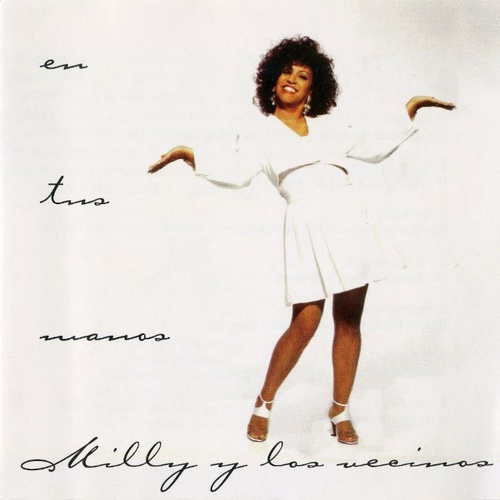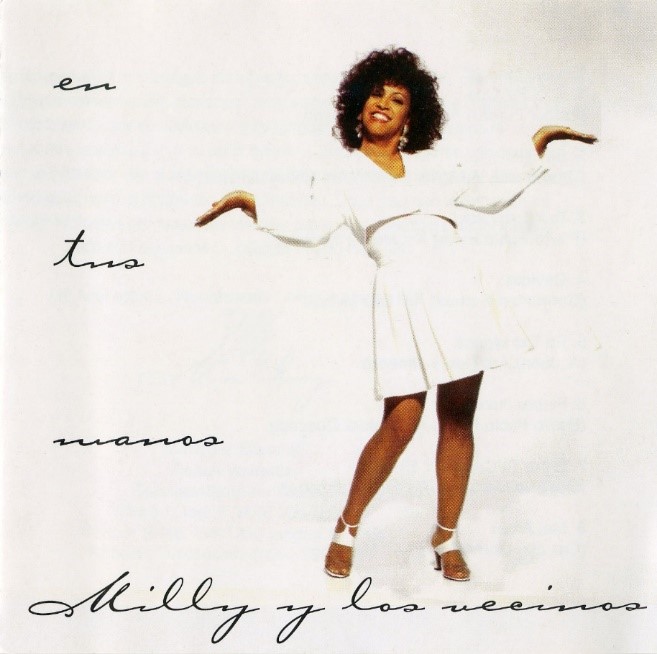Educational Resource: Milly Quezada “The Queen of Merengue”
Educational Profile
Milagros Quezada Borbón, known artistically as Milly Quezada, was born on May 21, 1955 in Santo Domingo, Dominican Republic. Her parents met in the city of Santiago after her maternal grandmother relocated the family there from Esperanza in the Cibao region of the Dominican Republic.
Milly Quezada is one of four children in a family, which includes her brother Rafael, her sister Jocelyn, and her youngest brother Martin. Members of the working class, they lived a modest life: Milly’s father worked as a presser at a dry cleaners and her mother was a saleswoman in a department store. Seeking better economic opportunities, the family joined the thousands of Dominicans who undertook the great migration to the United States. The Quezada family left the Dominican Republic in 1965 and settled in Washington Heights, a historically immigrant neighborhood in New York City that later became known as the heartland of the Dominican community in the U.S.
While she was growing up, Milly remained fascinated by Dominican cultural traditions, particularly the music. These elements will prove to be fundamental in the development of her music career in the U.S. and the Dominican Republic. The fact that they limited resources, did not prevent Quezada and her siblings to find ways to be creative. Reflecting on her childhood, Milly remarked that:
“It would always end up being musical, we would always end up playing instruments, whether it was using paint cans or two sticks, we found the way to make rhythms. The singing just came naturally.” [1]
In 1975, Milly Quezada began her formal music career when she and her two brothers Rafael and Martin formed the band Milly y los Vecinos. The group released their first album in 1976 that featured the group’s primary style, merengue, but also included some salsa and bolero. In 1978, the group expanded to include Milly Quezada’s younger sister Jocelyn. Jocelyn originally filled in for Milly during her first pregnancy, but in time, became a permanent member of the group, prompting them to change the group’s name to Milly, Jocelyn y los Vecinos.
Milly, Jocelyn y los Vecinos’ music expressed the Dominican experience in the United States. Their music also reflected changes in gender roles for women, many of whom have historically been the breadwinners in their families, a role they have played silently without being legitimized in society.[2] Especially popular was “Volvió Juanita,” featured on the group’s 1984 album, Esta Noche!. It tells the story of a Dominican woman who returns to the Dominican Republic after living in the United States for many years. The song became an iconic anthem representing Dominican migration to the U.S., a movement that is still numerically dominated by women as compared to men.
Milly, Jocelyn y los Vecinos gained great popularity, performing in Europe, Latin America, and Asia, but their most important touring site was the Dominican Republic, where Dominicans from the homeland and returnees joined to enjoy her music. Thousands of U.S.-based Dominicans annually travelled to their homeland for the holidays. Milly and her band seized the opportunity and made it a common practice to tour the Dominican Republic during Christmas. By the 1980s, merengue was so popular that it challenged salsa as a top contender for the most popular musical genre among Latin American audiences.
In the 1990s, Milly, Jocelyn y los Vecinos disbanded, and Milly launched a solo career; soon, she was being called the “Queen of Merengue.” Milly Quezada is remarkable for her unique determination to make it as a musician in an industry that remains dominated by men, despite the fact that women have made systematic contributions to it for many years. Milly achieved great success, becoming the first woman of Dominican descent to win a Latin Grammy, and performing at U.S. President George H.W. Bush’s Inauguration Gala. Sadly, in 1996, misfortune struck Milly, when her husband and manager, Rafael Marquez, passed away. She took a year-long break from the music industry, returning in 1997 to release an album entitled Hasta Siempre in honor of her late husband.
On April 4th, 2019 Quezada was named one of the most outstanding women of 2019 by the Dominican Congress.[3]
[1] Huezo, Alex. “The Queen of Merengue: Milly Quezada.” In The Dominican Republic Reader: History, Culture, Politics, edited by Eric Paul Roorda, Lauren Derby, and Raymundo González. Durham: Duke University Press, 2014, 481-482.
[2] The Mobility of Workers under Advanced Capitalism : Dominican Migration to the United States. Columbia University Press, 2002.
[3] “About Milly.” Millyquezadaonline.com, 2019, http://millyquezadaonline.com/en/about-milly/. Accessed 4 October 2019.
Discussion Questions
- What are some factors that might have influenced the Quezada family’s decision to settle in Washington Heights as opposed to other New York City neighborhoods?
- Why was it important for Milly, Jocelyn, y Los Vecinos to travel to the Dominican Republic during Christmas?
- What role did U.S.-based Dominicans traveling to the Dominican Republic specifically play in popularizing the band’s music?
- How central have women been in Dominican migration?
- What do you admire the most about Dominican women?
Activities
- A big part of Milly Quezada’s musical career included performing with her family much like The Jackson 5, Sister Sledge, Gladys Knight and the Pips, and The Bee Gees. Thinking about your own family, immediate and extended, who would you choose to make music with and why? Assign a position for each member, and write about what kind of music your group would perform; what kind of message(s) your group will share with the world.
Vocabulary
Anthem- a rousing or uplifting song identified with a particular group, body, or cause.
Inauguration Gala- a large social gathering, both white tie and black tie, held to celebrate the commencement of a new term of the President of the United States.
Latin Grammy Award- an award by The Latin Recording Academy to recognize outstanding achievement in the Latin music industry. The Latin Grammy honors works produced anywhere around the world that were recorded in either Spanish or Portuguese and is awarded in the United States.

